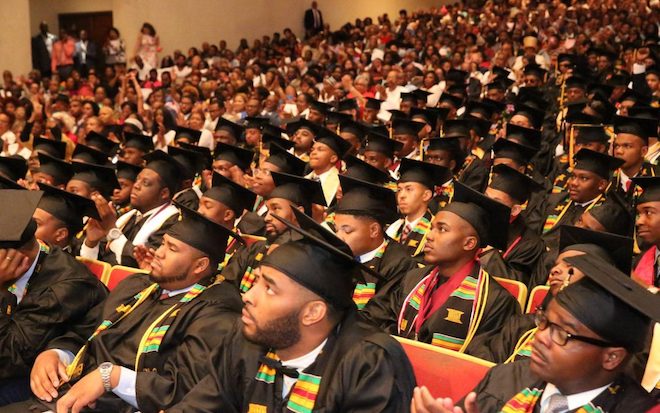
Morehouse College Graduation
The Rise of HBCUs
Historically Black colleges and universities (HBCUs) are growing in popularity.
Application submissions for HBCUs using the Common Black College Application are projected to reach 40,000 this year—nearly four times the total in 2016, The New York Times reports. In recent years, HBCUs have also seen increased funding—nearly $2 billion since 2017—and partnerships and exchange programs with Ivy League schools, such as Harvard and Princeton.
“We say this is a renaissance for H.B.C.U.s, but the level of clout and capital the institutions have now is unprecedented,” Lodriguez Murray, a senior vice president for the United Negro College Fund, the largest private scholarship provider for minority students and the leading advocacy organization for HBCUs, tells Erica L. Green of of the New York Times.
“Frankly, it is about time,” she adds.
A NEW GENERATION OF STUDENTS
Many Black students now see HBCUs as their first choice when applying to college. And for good reason.
“They belong to a generation whose adolescence was shaped not only by the election of the first Black president but also by political and social strife that threatened the lives and liberties of Black Americans,” according to the New York Times. “For many families, the embrace of historically Black colleges has been influenced by concerns about racial hostility, students’ feelings of isolation in predominantly white schools and shifting views on what constitutes the pinnacle of higher education.”
Experts point to recent social events—such as Black Lives Matter protests—that have propelled many families to consider the appeal of an HBCU education.
“Families started to look and be introspective about ‘Where are we sending our kids?’ and started to search for safe havens,” Lisa Fuller, the owner of College Primed, a college advising firm, tells the New York Times. “Students asked, ‘Do I go somewhere where it’s sink or swim, or do I go somewhere where everybody’s swimming with me?’”
HBCUs PLAY CRITICAL ROLE
In 2021, McKinsey released a report on “How HBCUs can accelerate Black economic mobility.” In the report, the authors highlighted the unique position that HBCUs play in supporting Black Americans today.
“According to our research and calculations, HBCUs have the potential to produce more high-earning graduates, support the development of more entrepreneurs, decrease student debt, and remove barriers for Black consumers,” the report states. “If the current level of attention and funding given to HBCUs can be sustained over time, these institutions can continue the critical work they have been doing since 1837: dramatically improving lives and livelihoods and advancing economic mobility for Black Americans.”
And data shows that HBCUs play an integral role in the economic mobility of its students.
“These institutions enroll more than twice as many Pell Grant-eligible (low-income) students as non-HBCU institutions and help create economic mobility for those populations,” according to the McKinsey report. “Graduates of HBCUs are 51 percent more likely to move into a higher-income quintile than graduates of non-HBCUs. The mean mobility rate across all US colleges is 1.6 percent, but the mean mobility rate for HBCUs is 3.0 percent.”
But it’s not just about economic mobility. For many Black students, HBCUs provide a community and a home where they feel heard and seen.
“Everything I thought I loved about loving Blackness has completely turned around,” SeKai Parker, a student at Spelman College, tells the New York Times. “Learning about my people, from my people, with my people, is such a powerful experience.”
Sources: The New York Times, McKinsey











Questions about this article? Email us or leave a comment below.